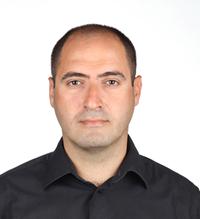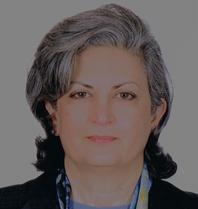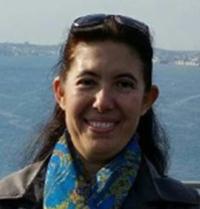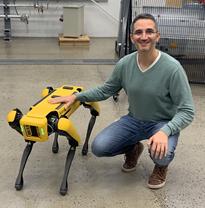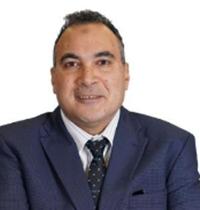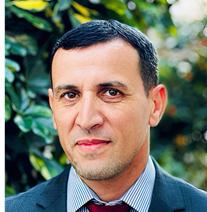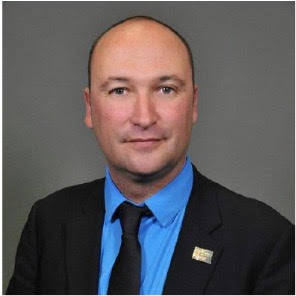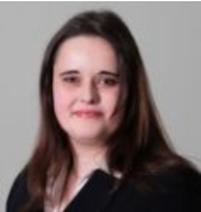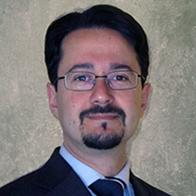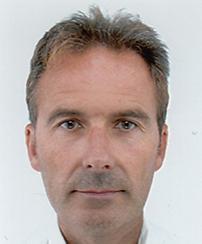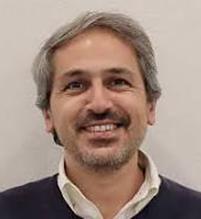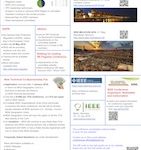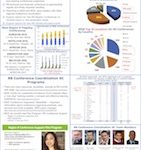You are welcome to apply for the IEEE Region 8 sponsorship of a technical event that you are planning. Please refer to the descriptions of our sponsorships. IEEE Region 8 annually supports an appreciable number of conferences, especially located in Europe, Africa, and Middle-East.
Please note that using the IEEE Region 8 logo or announcing an IEEE R8 sponsorship of a technical event before applying for sponsorship and obtaining approval from the IEEE R8 Vice-Chair, Technical Activities is strictly forbidden.
There exist two main types of sponsorship of conferences <further details>:
1. Financial sponsorship or co-sponsorship
In this case, the IEEE R8 is involved in technical, financial, publicity and administrative aspects of the conference. Two cases are possible:
- Sole Sponsorship: indicates full and sole R8 involvement in the conference. The R8 accepts complete responsibility for the technical, financial, publicity and administrative aspects of the conference.
- Co-Sponsorship: indicates a shared involvement (in the technical, financial, publicity and administrative areas of the conference) between the R8 and other entities. These entities are other IEEE Organizational Unit(s) and other “Not-for-Profit” non-IEEE organizations.
2. Technical Co-Sponsorship
In this case, the IEEE R8 is involved solely in the organization of the technical program of the conferences. The R8 has no financial involvement in the conference. Technical co-sponsorship may or may not include proceedings acquisition for IEEE Xplore.
Please note that conferences with approved technical co-sponsorship (no IEEE unit is involved as financial sponsor) will be charged a fee of $1,450 plus $22 per paper sent to IEEE Xplore to compensate for the IEEE technical co-sponsorship. No additional fee will be requested by the IEEE Region 8.
An exception to this general policy – MGA will continue to pay these fees if the external (non-IEEE) financial sponsor has a National Society Agreement with IEEE or has a Sister Society Agreement with one or more of the IEEE Societies <link>.
R8 Sponsorship Requirements:
IEEE Region 8 may co-sponsor (FCS), or technically co-sponsor (TCS) other conferences, including workshops, symposia, and similar meetings, that serve to advance its mission and purposes and the interests of R8 IEEE members.
Conference co-sponsorship is regarded as shared management. Region 8 provides the following benefits and requires some conditions as presented below:
| Benefits of R8 Conference Sponsorship |
Flagship
|
Portfolio
|
FCS |
TCS |
Concurring
|
| 1. Repayable Loan -seed funding (to be returned after conference closing) |
USD 5k
|
USD 5k
|
|
|
|
| 2. R8 Steering Committee |
x
|
x
|
|
|
|
| 3. Guidance of the organizing committee (by an assigned CoCC liaison member) |
x
|
x |
x |
x |
x
|
| 4. E-notices to R8 members |
5
|
5 |
4 |
3
|
|
| 5. R8 media publicity (R8news, social media, R8Today, …) |
x
|
x |
x
|
|
|
| 6. Organizing side R8 CoCC workshop/session/meeting |
x
|
x
|
|
|
|
| 7. Assistance for conference Application/MoU |
x
|
x
|
|
|
|
| 8. R8 Director participation in the opening session |
x
|
x
|
|
|
|
| 9. Participation of a R8 CoCC representative |
x
|
x
|
x
|
|
|
| 10. IEEE R8 booth |
x
|
x
|
|
|
|
| 11. Announce conferences in R8 website |
x
|
x |
x |
x
|
|
| 12. Organizing special events in cooperation with R8 Committees (SAC, YP, WIE, AfI, etc.) |
x
|
x# |
x+
|
|
|
| 13. Free plagiarism check provided by IEEE |
x
|
x |
x |
x |
x
|
| 14. IEEE Web hosting and IEEE domain for the conference website and email address provided by IEEE for each flagship/portfolio conference |
x
|
x |
|
|
|
|
Requirements for R8 Conference Sponsorship
|
Flagship |
Portfolio |
FCS |
TCS |
Concurring
|
| 1. Region 8 FCS (%) |
>=30%
|
>=30% * |
>=5% |
0% |
NA
|
| 2. Local Organizing Section FCS (%) |
>=50%
|
>=50% * |
>=5%
|
|
|
| 3. Local OU officer(s) involved as program committee co-chair(s) |
x
|
x
|
|
|
|
| 4. R8 Senior/Fellow members involved as conference co-chairs (CC), technical program co-chairs (TPC), program committee (PC) members |
all CC and TPC
|
all CC and TPC |
at least 1 CC,
1 TPC,
5 PC |
at least
1 TPC,
5 PC |
at least
1 TPC,
1 PC
|
| 5. Program committee members from different R8 countries |
x
|
x |
x |
x |
|
| 6. Progress meetings of the organizing committee with the R8 CoCC representative (liaison) |
Monthly
|
at least 4 |
at least 2 |
email |
email
|
| 7. Involvement (FCS/TCS) of local Section and at least two local Chapters (or Societies / Councils/ IEEE Technical Communities/IEEE OUs) in the conference field |
x
|
x |
x |
x
|
|
| 8. Free Registrations for R8 representatives (including R8 student paper contest – SPC) that conference must provide |
Up to 8
|
Up to 4 |
Up to 2 |
1 |
|
| 9. Submit R8 Conference Final report (link) |
x
|
x |
x |
x |
x
|
| 10. Previous R8 involvement |
NA
|
at least 1 edition as R8 FCS |
At least 1 edition as R8 TCS
|
|
|
| 11. Promote the R8 Voluntary Contribution Fund (VCF) |
x
|
x |
x
|
|
|
* Unless otherwise stated in a specific Operations Agreement
# Only when the conference takes place in R8
+ This possibility will be evaluated by the R8 case by case
Important Notes:
- The relationship between sponsoring organizations must be explicitly defined in the Memorandum of Understanding (MOU), signed following the submission of the IEEE conference application form <link> (application form screenshots)(application checklist).
- The IEEE Region 8 may cancel the approved MOU at any time if the technical quality issues are not considered.
- Plagiarism check of all submitted papers (first and final versions) is required using crosscheck.ieee.org
- Registration fees must include reduced fees for IEEE members: a minimum of 10%.
- Conference applications must be submitted before 10 months. Applications received after these deadlines most likely will not be approved.
- Conference committee members should complete the Training online courses <link>
- The dates should not conflict with other IEEE Region 8 conferences in related field.
- The conference application should include the contacts of all conference chairs, technical chairs, publication chair, and the treasurer. Incomplete applications will be returned without processing.
- Any revisions to a previously approved budget, deadline extension, program, etc., must be submitted to the conference coordination subcommittee for re-approval.
- The quality report and the conference proceedings should be submitted within 30 days to the conference coordinator in Region 8.
- The conference organizers should offer free registration fees for at least two IEEE student members. These two students could help in the local arrangement issues.
- An IEEE booth should be organized in the conference venue.
- The IEEE Region 8 is committed to approve or decline your sponsorship request within one month.
- Become familiar with:
- IEEE Brand guidelines <link>
- Conference Organizer Roles and Responsibilities <link>
- Financial Sponsor: Receives a portion of the surplus or are liable for a portion of the deficit resulting from a conference, plus have direct and substantial involvement in the development of the technical program
- Technical Sponsor: Has a direct and substantial involvement in the development of the technical program, but no financial stake in the conference surplus or deficit
- Patron: Organizations that help financially the conference without any involvement in organizing the conference
- Recommended Practices to Ensure Technical Conference Content Quality <link>
- Guide to Scope and Quality Criteria <link>
- IEEE Conference timeline <link xls file> <link pdf file>
- IEEE Author Ethics Guidelines <link>
- IEEE Policy regarding Authors rights to post accepted versions of their articles <link>
- Respect of the:
- IEEE Code of Ethics (section 7.8 from the IEEE Policy Manual) <link>
- IEEE Publications Operations Manual <link>
- IEEE Technical Activities Operations Manual (Section 6) <link>
- IEEE MGA Operations Manual (Section 10) <link>
- Please be advised that per IEEE Policy:
- The term “IEEE” shall be used in the names of sole sponsored and co-sponsored conferences where IEEE is at least 50% financial sponsor (in total for all IEEE co-sponsors).
- The use of the term “IEEE” could be used in the names of co-sponsored conferences in which IEEE is less than a 50% but at least a 25% financial sponsor (in total for all IEEE co-sponsors) (recommended but not required).
- The term “IEEE” shall not be used in the names of co-sponsored conferences in which IEEE is less than a 25% financial sponsor (in total for all IEEE co-sponsors). This includes conferences in which IEEE is only a technical co-sponsor or is not a sponsor in any form.
- If it will be your first request of IEEE R8 sponsorship, we recommend to follow steps <link>. Don’t hesitate to contact us at [email protected] before the submission of your conference application.
IEEE Meeting & Conference Management (MCE)
IEEE conference services are provided for IEEE sponsored conferences (by IEEE R8 and/or other IEEE units). Numerous services includes:
- Overall guidance
- Organiser/OU education and training
- Identifying and facilitating sponsorship
- Finance, budgeting, insurance, contract review and approval
- Banking and credit card processing
- Memorandums of Understanding (MOUs)
- Publication of your proceedings
- Webpage design
- Marketing your conference
- Site location, event management, meeting logistics
- Contract negotiations, food & beverage planning, supplier management
Further details are available in:

IEEE Convene

|
Convening the Conference Community
16-17 July 2020 Copenhagen, Denmark.
IEEE Convene, the annual event for leading scholarly conference organizers around the world, has been canceled because of the COVID-19 pandemic.
https://ieeeconvene.org
|
IEEE Convene post-event report

August 2018 (PDF, 1.3 MB)
The IEEE Convene (previously IEEE Panel of Conference Organizers (POCO)) is the annual event for leading scholarly conference organizers around the world. IEEE organizes this event to share resources and ideas with all scientific associations and non-profit conference organizers. Convene convenes thought leaders and decision makers to address conference leadership practices, discuss challenges in the conference landscape, envision the future, and launch new conference initiatives.
On-Demand Conference Education Resources Available:
MCE Conference Education provides a comprehensive set of education resources, including 25 eLearning courses plus 28 on-demand webinars on a wide range of conference topics. All courses are available in the IEEE Center for Leadership Excellence (CLE). Conference role-specific learning paths help you gain the knowledge and skills to be successful. Learning paths are provided for: Conference Treasurer, Technical Program Chair, Conference Publications Chair, Event Planning. <Conference Education Programs>.
Webinars:
- 28.05.2020 Strategic Approach to Plagiarism Screening for IEEE Conferences: Learn more about strategically implementing plagiarism screening using Similarity Check (formerly CrossCheck) for your IEEE conference. Understand the various workflow options and learn the difference between similarity and plagiarism. View Playback
- 30.06.2020 Peer Review – Overview
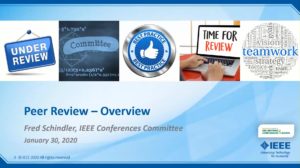
Frequently asked questions and guidelines / templates
1. IEEE Region 8 Publicity Service
IEEE Region 8 technically and financially co-sponsored conferences have access (after MOU approval) to a unique service of sending their conference promotional materials to IEEE Region 8 members, via:
Please make sure your message is clear, understandable and accurate. The IEEE Region 8 OpCom and Conference Coordination Subcommittee maintain the right to reject the message, for example in case of false advertising.
2. Training material
IEEE Members or Volunteers interested in setting up an IEEE conference in partnership with one or more technical IEEE organizational units (OUs) in Region 8, please refer to the training material:
-
-
- Conference Basics – How to Start a Conference: Tap the wealth of IEEE knowledge gathered over the years on how to have a successful conference. In addition, find out about IEEE Conference business requirements and support services.
- Conference Initiation: This tutorial provides an overview of the conference initiation process, including IEEE sponsorship, Memorandums of Understanding, contracts, and registering an IEEE conference.
- Conference Finances: Learn about the financial considerations and best practices over the lifecycle of the conference, including tax requirements and services.
- Conference Publications: This overview of the processes and services supporting the development of your conference proceedings, includes information on the IEEE Conference Publications Program and IEEE Xplore.
- Contingency Planning for Conferences: This module provided valuable information for planning for, and responding to, emergencies that may occur at conferences.
- Post_Conference Reporting (PDF, 98KB)
- Handling Indirect Tax and Insurance for IEEE Conferences – July 2012 (PDF, 263KB)
3. Guidelines and Procedures for Bidding to host IEEE Region 8 Flagship Conferences
4. IEEE Region 8 Conference guidelines and rules (“conference organizer’s handbook”)
5. New GDPR Regulation
The General Data Protection Regulation (GDPR), originating in the European Union, is expected to have far-reaching implications on how organizations, like IEEE, conduct business worldwide, including conferences.
This regulation places new obligations on organizations that market, track, or handle personal data. This legislation goes into effect on 25 May 2018.
IEEE is reviewing policies and business processes that involve personal data and continues to take steps towards compliance.
IEEE aims to ensure that we are able to communicate with our conference related audiences in our volunteer activities in a compliant and efficient manner. One of the key items for compliance is ensuring your current IEEE data is compliant with the GDPR.
Personal data collected without consent of an individual may not be compliant. This means that use of existing lists may no longer be allowed. (Attendee lists, Excel spreadsheets, Listserv, etc.)
IEEE will be providing solutions over the next several weeks and months. In addition, training will be available shortly.
More information is available here: http://sites.ieee.org/gdpr/
Please select an expense category from the picklist to classify this transaction. If your transaction captures expenses extending across multiple categories please select the category which covers the majority of the expense.
6. Expense Type
- Management Services: Payments to management companies, professional conference organizers, MCE Services/Sales etc.
- Registration: Fees incurred on gross revenue income and cost of setting up a registration platform.
- Equipment rentals
- Badges and badge printing, ribbons
- Onsite registration booth rental
- Online registration processing fees & registration website development and management.
- Promotion: Costs incurred on materials for promoting the conference.
- Calls for papers
- Advertisements in periodicals and magazines
- Website & promotional management fees
- Publication: Cost of proceedings, papers, printing, publication shipping etc.
- Exhibits: Booth/table and site setup, exhibit room fee (depends on hotel contract), per‐diem, and exhibit commission reimbursement (for combined conferences).
- Local Arrangements: Hotel room or convention center charges, equipment, computer, copy machine, LCD, projector, onsite temps, conference room signage, decorations, attendee gifts, hotel penalties, gratuities, securities, transportation. Fees paid to local IEEE sections/chapters for their time spent in setting up local arrangements. (costs for committee members that are being covered by the conference should be included in Committee Expenses).
- Social Functions: Costs related to Food and beverage, breaks, excursions, or ceremonies, not covered in conference registration fees.
- Program: Speaker expenses, expenses for additional courses, attendee souvenirs, awards and honoraria.
- Administration: Includes bank charges, account fees, wire transfer fees, foreign exchange commission, secretarial fees, accountant fees, additional insurance coverage, student grants, stationary, printing, shipping items to and from the event (excluding promotional shipping), grant administration, office supply, telephone, fax, and staff travel.
- Society Admin Fee: A fee sometimes charged by an IEEE Society for their assistance in facilitating or sponsoring a conference.
- Audit Fee: Fee of audit if the conference requires audit by IEEE Policy (if the conference generate gt; 250k in revenue or expense AND has an IEEE financial sponsorship over 50%).
- Committee: Organizing committee expenses related to stay, transportation, gifts, calls, and food.
- VAT Owed: Indirect tax payments incurred.
- Other: Contingencies, overhead expenses, petty cash, and other miscellaneous expenses that do not fall under the categories listed above.







